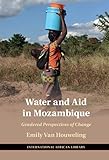Water and aid in Mozambique : gendered perspectives of change / Emily Van Houweling, Regis University International African Institute, London.
Material type: TextSeries: The international African libraryPublisher: Cambridge, United Kingdom ; New York, NY : Cambridge University Press, ©2022Edition: First editionDescription: viii, 231 pages : 24 cm. illustrationsContent type:
TextSeries: The international African libraryPublisher: Cambridge, United Kingdom ; New York, NY : Cambridge University Press, ©2022Edition: First editionDescription: viii, 231 pages : 24 cm. illustrationsContent type: - text
- unmediated
- volume
- 9781009193481
- 9781009193498
- 333.910209679 23/eng/20220622
- HD1699.M9 HOU
- SOC002000
 Books
Books
| Item type | Current library | Collection | Call number | Status | Date due | Barcode | |
|---|---|---|---|---|---|---|---|
 Books
Books
|
GSU Library Epoch General Stacks | Non-fiction | HD1699.M9HOU (Browse shelf(Opens below)) | Available | 50000005849 |
Includes bibliographical references and index.
1. Introduction; 2. Divergent development discourses; 3. Life before the handpumps; 4. Sustainability and sense of ownership; 5. The politics of water access; 6. Gender roles and water practices with the handpumps; 7. Development encounters; 8. Conclusions; Glossary; Bibliography.
"Analysing how water development projects unfolded in five rural communities in Mozambique, Emily Van Houweling offers an alternative perspective on water and the politicised nature of water management in the region. Using a hydro-social cycle framework, she demonstrates how water is tied to everyday life in matrilineal Nampula and how social relations, gender roles, and local politics were reconfigured during the project. While centring the experience of community members, Van Houweling also includes the perspectives of project implementers, showing how project plans were translated and negotiated as they worked their way down to the community. Employing the concept of organisational culture, Van Houweling reveals the tensions that resulted from different actors' decision-making processes and motivations, and illuminates possible explanations for the gaps between policy and practice. Exploring women's empowerment, community ownership, and participation, this book facilitates innovative ways for thinking about evaluation, sustainability, and gender-water relations.Analysing how water development projects unfolded in five rural communities in Mozambique, Emily Van Houweling offers an alternative perspective on water and the politicised nature of water management in the region. Using a hydro-social cycle framework, she demonstrates how water is tied to everyday life in matrilineal Nampula and how social relations, gender roles, and local politics were reconfigured during the project. While centring the experience of community members, Van Houweling also includes the perspectives of project implementers, showing how project plans were translated and negotiated as they worked their way down to the community. Employing the concept of organisational culture, Van Houweling reveals the tensions that resulted from different actors' decision-making processes and motivations, and illuminates possible explanations for the gaps between policy and practice. Exploring women's empowerment, community ownership, and participation, this book facilitates innovative ways for thinking about evaluation, sustainability, and gender-water relations"-- Provided by publisher.
There are no comments on this title.

